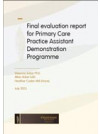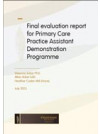This report is an evaluation of a demonstration site coordinated by Health Workforce New Zealand. A primary care practice assistant is a new type of health care worker for general practices, responsible for clinical and administrative tasks.
Purpose
The aim was to provide a trained flexible workforce to work in any aspect of a general practice with stable and predictable patients under the direction and delegation of the range of professionally trained staff.
Methodology
The evaluation contained both qualitative and quantitative information. A qualitative research design was the most appropriate approach to examine the experiences of a range of primary health workers and the patients they served. Quantitative analysis of measurable data gave information on the cost benefits of employing a PCPA and where rankings provided information able to be quantified. A range of data collecting methodologies were utilised including surveys, interviews (both face to face and by telephone), analysis of course curriculum documents, international and national literature and analyses of financial and other consequences of employing a PCPA in a practice.
All PCPAs and a sample of 10 practice nurses, 10 practice managers and 10 GPs were interviewed at least once over the period of the evaluation. One hundred and seventy four of 180 invited patients across 12 practices completed satisfaction surveys.
Key Results
This evaluation report finds the role can: free practice nurses for patient education and nurse-led clinicsfree GPs to see more patients an hour and pursue medical interests including minor surgery, skin clinics or ophthalmology shorten waiting times for patients.


